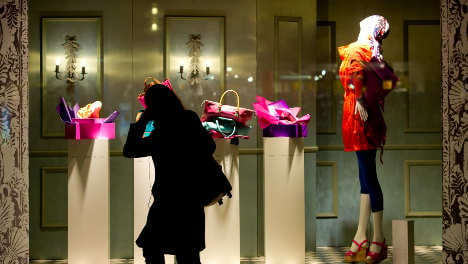Consumer confidence in Germany is stagnating, market research company GfK said, hard on the heels of data showing the eurozone crisis had pushed down business confidence, setting off recession warning bells.
While the eurozone debt crisis has brought Greece to its knees and caused Spain, its fourth-largest economy, to wobble, Germany has until recently weathered the turbulence relatively unscathed.
But consumers in Europe’s powerhouse appeared cautious. GfK said in a statement that its household confidence index was forecast to remain at 5.9 points in October, the same level as September.
While consumers’ willingness to spend, and their assessment of the economic situation had improved, they expected their own personal income situation to worsen over the coming months, the GfK said.
The headline consumer confidence ranking is based on responses from about 2,000 households on their expectations about pay and the economy as a whole in the coming months, as well as their willingness to spend money.
On Monday, economists warned that Germany was headed for recession after the eurozone crisis pushed down business confidence in the country to the lowest level since February 2010.
The Ifo economic institute said its closely watched survey of the business climate in Germany dropped unexpectedly in September for the fifth month running to 101.4 points from 102.3 points in August.
Jennifer McKeown, an analyst at Capital Economics, said the data was a reminder that even the eurozone’s strongest economies were suffering, which could in turn hit their ability to help weaker neighbours.
“It seems like only a matter of time before the economy starts to contract. This will make support for the peripheral economies even more difficult to muster,” she said.
Germany has relied on its powerful export motor to keep the economy humming through the nearly three-year crisis in the 17-country bloc, notching up modest growth of 0.3 percent in the second quarter while the eurozone as a whole contracted by 0.2 percent.
But new car registrations, a key indicator of demand in Germany, tumbled sharply in August. Retail sales figures also declined and unemployment is starting to rise.
The head of the Federation of German Industry (BDI), Hans Peter Keitel, warned the government on Tuesday against putting further stresses on the economy – citing rising energy costs and the push for a transaction tax as just some of the burdens that threaten to put the brakes on economic growth.
For some firms, mounting cost pressure is already being passed on to the consumer. German national rail service Deutsche Bahn announced Tuesday that it will raise prices for passengers by nearly 3 percent starting December 9, due to higher fuel prices.
AFP/DAPD/The Local/arp



 Please whitelist us to continue reading.
Please whitelist us to continue reading.
Member comments